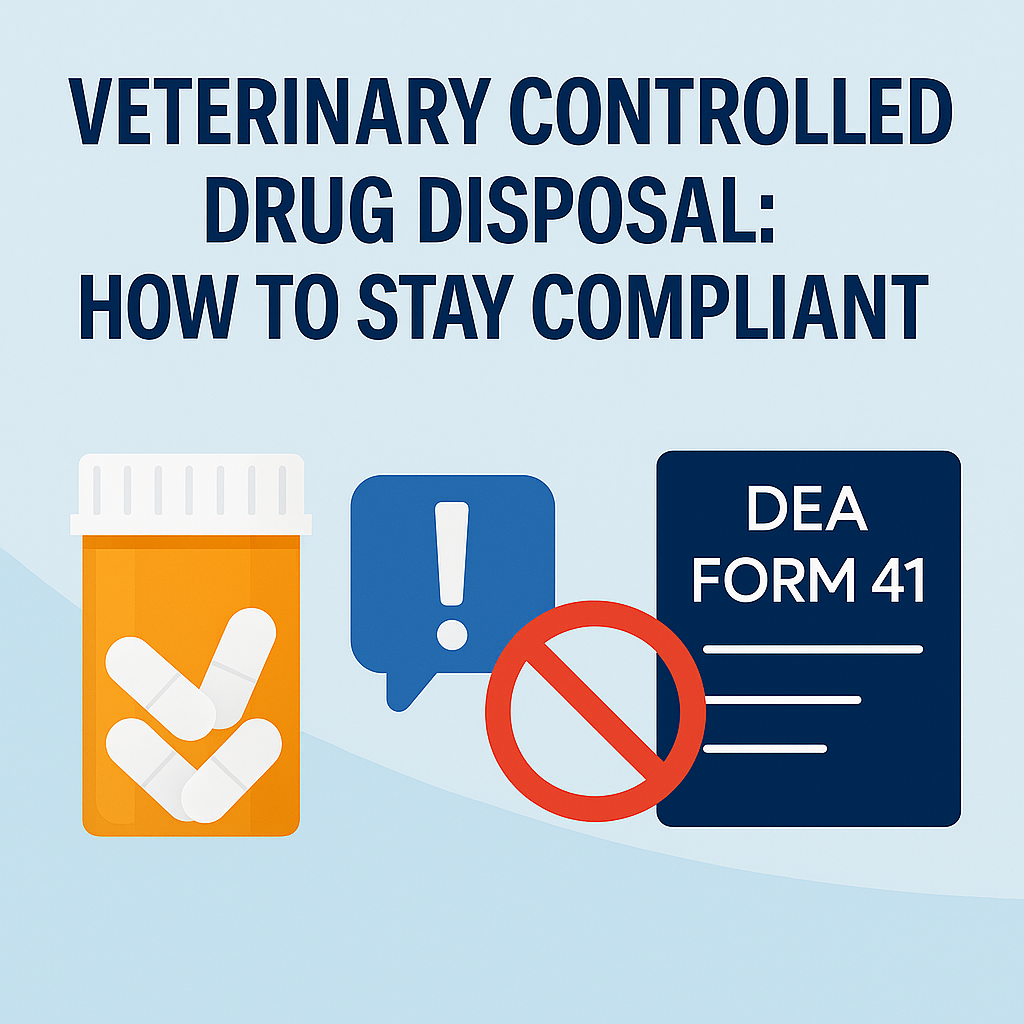How to Dispose of Controlled Drugs for Ambulance Services
How Ambulance Services Should Dispose of Controlled Drugs Ambulance and EMS providers frequently carry controlled substances such as opioids,...

Hospitals manage a wide variety of controlled substances, including opioids, sedatives, and specialty medications. While essential for patient care, these drugs carry strict legal responsibilities. Improper disposal can result in DEA fines, environmental contamination, and increased risk of drug diversion.
This guide walks hospitals through DEA-compliant methods for controlled drug disposal, including reverse distribution, mail-back programs, and on-site destruction options, while showing how Easy Rx Cycle can make compliance simple, safe, and environmentally protective. Need help? Request a Quote!
Learn More:
Looking for the Best Pharmaceutical Disposal Companies: Safe & DEA-Compliant?
What is a DEA Forms 222, 41, and COD Explained?
What are the Best Drug Disposal Companies: Safe & DEA-Compliant or the Best Reverse Distributors?
Controlled drugs are classified by the Drug Enforcement Administration (DEA) into five schedules based on their potential for abuse and accepted medical use:
Schedule II: Morphine, fentanyl, oxycodone
Schedule III: Ketamine, buprenorphine
Schedule IV–V: Diazepam, tramadol, gabapentin
Hospitals must follow federal, state, and DEA regulations when handling these medications. Improper disposal can lead to disciplinary action, DEA audit failures, or even criminal liability.
Hospitals are responsible for every controlled substance in their inventory. Improper disposal can lead to:
DEA fines or license suspension
Environmental contamination, including water supply risks
Drug diversion or misuse by staff or the public
Audit failure or criminal liability
Proper disposal ensures hospitals protect patients, staff, and the community while remaining compliant with RCRA, EPA, and DEA regulations.
A reverse distributor is a DEA-registered company that safely collects, transports, and destroys controlled substances. This is the most reliable and scalable solution for hospitals of all sizes.
Easy Rx Cycle Offers:
DEA-registered collection and destruction
DEA Form 222 for Schedule II drugs
DEA Form 41 to document destruction
Certificates of Destruction (COD) for audit purposes
Full chain-of-custody and tracking
Flat-rate pricing with no long-term contracts
Reverse distribution ensures hospitals stay compliant while safely disposing of hazardous pharmaceutical waste.
Some hospitals destroy drugs on-site through chemical or incineration methods. While legal, this method requires:
Drugs must be rendered irretrievable
DEA Form 41 must be completed and retained
Destruction witnessed by two licensed staff members
Documentation stored for at least 2 years
⚠️ Warning: On-site destruction is high-risk and frequently triggers DEA audit findings. It’s recommended only for hospitals with robust compliance systems.
Hospitals with smaller pharmacy units or satellite facilities can use mail-back programs, which include:
Secure, tamper-proof containers
Prepaid return shipping
Step-by-step disposal instructions
Documentation for DEA Form 41
Mail-back programs complement reverse distribution for low-volume units, remote hospitals, or outpatient pharmacies.
DEA Form 222: Transfers Schedule II drugs to a reverse distributor
DEA Form 41: Documents destruction of all controlled drugs (Schedules I–V)
Certificate of Destruction (COD): Proof of compliant destruction for DEA audits
Hospitals must retain all forms and CODs for at least 2 years.
Hospitals often fail DEA audits due to:
Flushing controlled drugs (illegal and environmentally harmful)
Disposing of drugs in medical or regular waste
Incomplete DEA Forms 222 or 41
Missing witness signatures for on-site destruction
Working with unlicensed vendors
Avoid these pitfalls by using a DEA-compliant reverse distributor like Easy Rx Cycle.
✅ Maintain an up-to-date controlled substance inventory
✅ Review drug stock weekly
✅ Segregate expired, unused, or damaged drugs
✅ Use a DEA-registered reverse distributor
✅ Complete DEA Form 222 for Schedule II transfers
✅ Complete DEA Form 41 for all destruction and obtain COD
✅ Store all compliance records for at least 2 years
✅ Implement mail-back programs for low-volume or remote units
Easy Rx Cycle provides nationwide, DEA-compliant pharmaceutical disposal tailored for hospitals:
Reverse distribution for controlled drugs and hazardous pharmaceutical waste
Mail-back programs for smaller units or remote facilities
DEA Forms 222 and 41 support
Certificates of Destruction for all disposals
Flat-rate pricing, no long-term contracts
Expert guidance for DEA audits and compliance
Whether your hospital handles high-volume opioids or specialty medications, Easy Rx Cycle ensures disposal is safe, compliant, and environmentally protective.
Q: Can hospitals flush expired medications?
A: No. Flushing is prohibited by DEA and EPA regulations and is environmentally harmful. Always use DEA-compliant methods.
Q: How often should hospitals dispose of controlled drugs?
A: Every 30–90 days depending on inventory. Reverse distributors can help establish a safe disposal schedule.
Q: What is a Certificate of Destruction (COD)?
A: A COD verifies that controlled drugs were safely destroyed, required for DEA audits.
Q: Can hazardous pharmaceutical waste be handled through reverse distribution?
A: Yes. Reverse distributors safely manage hazardous and cytotoxic drugs following DEA, EPA, and RCRA rules.
Q: Are mail-back programs suitable for all hospital units?
A: Yes, especially for small-volume or remote pharmacy units. They complement onsite reverse distribution.
Don’t risk fines, audits, or environmental harm. Let Easy Rx Cycle handle your hospital’s controlled drug disposal with:
DEA-authorized reverse distribution
Mail-back programs for small or satellite units
DEA Forms 222 and 41 support
Certificates of Destruction (CODs)
Nationwide service with flat-rate pricing
📞 Request a Quote or Free Mail-Back Kit:
👉 Request a Quote
👉 Call (501) 904-2929
Ensure your hospital stays compliant, safe, and environmentally responsible.

How Ambulance Services Should Dispose of Controlled Drugs Ambulance and EMS providers frequently carry controlled substances such as opioids,...

How Physician Offices Should Dispose of Controlled Drugs Physician offices frequently prescribe and dispense controlled substances such as opioids,...